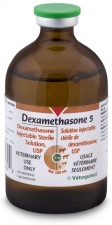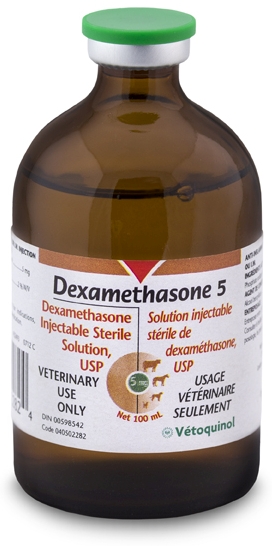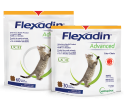




VETERINARY USE ONLY
DIN 00598542
Dexamethasone 5 is a synthetic analogue of prednisolone having similar but more potent anti-inflammatory therapeutic action and different hormonal and metabolic effects.
As with any drug, animals receiving Dexamethasone 5 should be kept under close observation and the dosages recommended should not be exceeded. All the precautions and contraindications for adrenocortical hormones apply at this time to the drug.
The dosage of Dexamethasone 5 required is markedly lower than that of prednisolone. The sections on indications, dosage, and precautions should be read before this drug is used.
ACTIVE INGREDIENTS (per mL)
|
Dexamethasone sodium phosphate |
5 mg |
PRESERVATIVE
|
Benzyl Alcohol |
2% W/V |
Dexamethasone 5 must be administered by the intravenous or intra-muscular route.
Therapy with Dexamethasone 5 should be individualised according to the severity of the condition being treated, anticipated duration of steroid therapy and the patient’s threshold or tolerance for steroid excess. The lowest dose that will offer adequate relief in chronic conditions should be the dose employed. Large doses, however, may be necessary and in such instance, the patient must be closely observed for the occurrence of side effects. Acute conditions sometimes demand the use of larger doses for a short period of time in order to obtain the necessary degree of relief.
DOSAGE
DOGS: 0.25 to 1.0 mg I.V. or I.M. The dose may be repeated if necessary.
CATS: 0.125 to 0.5 mg I.V. or I.M. The dose may be repeated if necessary.
HORSES: 2.0 to 5.0 mg I.V. or I.M. The dose may be repeated if necessary.
CATTLE: 5.0 to 20.0 mg I.V. or I.M. The dose may be repeated if necessary.
When using Dexamethasone 5 as supportive therapy in horses, dogs and cats, the doses suggested above may be used. The use of this product for the above mentioned conditions does not preclude the necessity for using complementary therapy to treat the primary condition.
Treatment may be changed over to dexamethasone from any other glucocorticoid with proper adjustment of dosage.
All of the precautions and contraindications for adrenocortical hormones must be followed, taking into consideration that the warning signs of cortisone over-dosage such as sodium retention, fluid retention, potassium loss, weight gain, etc. may not be present. Animals receiving the drug should be under close observation to detect these possible untoward effects. When side effects occur, it may be necessary to reduce the dose of the drug or to discontinue therapy.
One should consider the possibility that continuous large doses of dexamethasone will result in some depression of adrenal corticoid function and may produce adrenal atrophy. Then, after long-term therapy, the drug should be withdrawn gradually rather than abruptly.
As all glucocorticoids, Dexamethasone 5 may mask the signs of infection or cause onset of latent infection. For these reasons, it may be advisable to institute proper antibacterial therapy together with Dexamethasone 5. The possible action of dexamethasone in delaying wound healing should be kept in mind.
Doses of dexamethasone above 5 mg, may produce transient drowsiness or lethargy in some horses. The lethargy usually abates in 24 hours.
Access the Compendium
For more information on Vetoquinol products and labels, please visit the Compendium website










